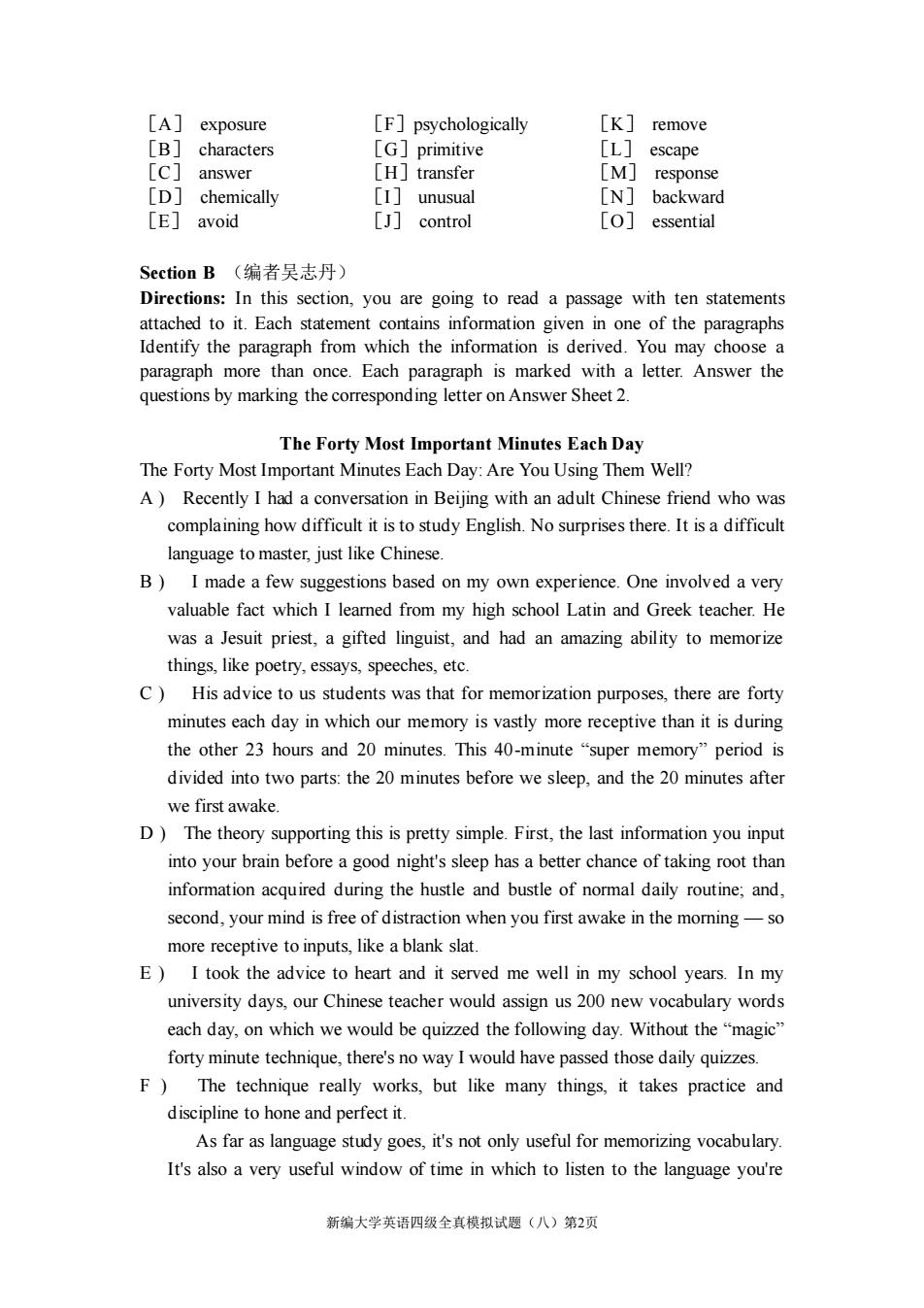正在加载图片...

[A]exposure [F]psychologically [K]remove [BT characters [G]prim 「11 escape answe [H]transfe [Di chemically [I] unusual [N backwarc E avoid J control O essential Section B(编者吴志丹) Directions:In this section,you are going to read a passage with ten statements attached to it.Each statement contains information given in one of the paragraphs Identify the paragraph from which the information is derived.You may choose a parag once.Each par graph is marked with a letter Answer the questions by marking the corresponding letter on Answer Sheet 2. The Forty Most Important Minutes Each Day The Forty Most Important Minutes Each Day:Are You Using Them Well? A)Recently I had a conversation in Beijing with an adult Chinese friend who was complaining how difficult it is to study English.No surprises there.It is a difficult language to master,just like Chinese. B)I made a few suggestions based on my own experience.One involved a very valuable fact which I leamned from my high school Latin and Greek teacher.He was a Jesuit priest,a gifted linguist,and had an amazing ability to memorize things,like poetry,essays,speeches,etc. C)His advice to us students was that for memorization purposes,there are forty minutes each day in which our memory is vastly more receptive than it is during the other 23 hours and 20 minutes.This 40-minute"super memory"period is divided into two parts:the 20 minutes before we sleep,and the 20 minutes after we first awake D)The theory supporting this is pretty simple.First,the last information you input into your brain before a good night's sleep has a better chance of taking root than information acquired during the hustle and bustle of normal daily routine;and, second,your mind is free of distraction when you first awake in the moming-so more receptive to inputs,like a blank slat. E)I took the advice to heart and it served me well in my school years.In my university days,our Chinese teacher would assign us 200 new vocabulary words each day,on which we would be quizzed the following day.Without the "magic forty minute technique.there's no way I would have passed those daily quizzes. F)The technique really works,but like many things,it takes practice and discipline to hone and perfect it. As far as language study goes,it's not only useful for memorizing vocabulary. It's also a very useful window of time in which to listen to the language you're 新编大学英语四级全真模拟试题(八)第2员新编大学英语四级全真模拟试题(八)第2页 [A] exposure [B] characters [C] answer [D] chemically [E] avoid [F]psychologically [G]primitive [H]transfer [I] unusual [J] control [K] remove [L] escape [M] response [N] backward [O] essential Section B (编者吴志丹) Directions: In this section, you are going to read a passage with ten statements attached to it. Each statement contains information given in one of the paragraphs Identify the paragraph from which the information is derived. You may choose a paragraph more than once. Each paragraph is marked with a letter. Answer the questions by marking the corresponding letter on Answer Sheet 2. The Forty Most Important Minutes Each Day The Forty Most Important Minutes Each Day: Are You Using Them Well? A ) Recently I had a conversation in Beijing with an adult Chinese friend who was complaining how difficult it is to study English. No surprises there. It is a difficult language to master, just like Chinese. B ) I made a few suggestions based on my own experience. One involved a very valuable fact which I learned from my high school Latin and Greek teacher. He was a Jesuit priest, a gifted linguist, and had an amazing ability to memorize things, like poetry, essays, speeches, etc. C ) His advice to us students was that for memorization purposes, there are forty minutes each day in which our memory is vastly more receptive than it is during the other 23 hours and 20 minutes. This 40-minute “super memory” period is divided into two parts: the 20 minutes before we sleep, and the 20 minutes after we first awake. D ) The theory supporting this is pretty simple. First, the last information you input into your brain before a good night's sleep has a better chance of taking root than information acquired during the hustle and bustle of normal daily routine; and, second, your mind is free of distraction when you first awake in the morning — so more receptive to inputs, like a blank slat. E ) I took the advice to heart and it served me well in my school years. In my university days, our Chinese teacher would assign us 200 new vocabulary words each day, on which we would be quizzed the following day. Without the “magic” forty minute technique, there's no way I would have passed those daily quizzes. F ) The technique really works, but like many things, it takes practice and discipline to hone and perfect it. As far as language study goes, it's not only useful for memorizing vocabulary. It's also a very useful window of time in which to listen to the language you're